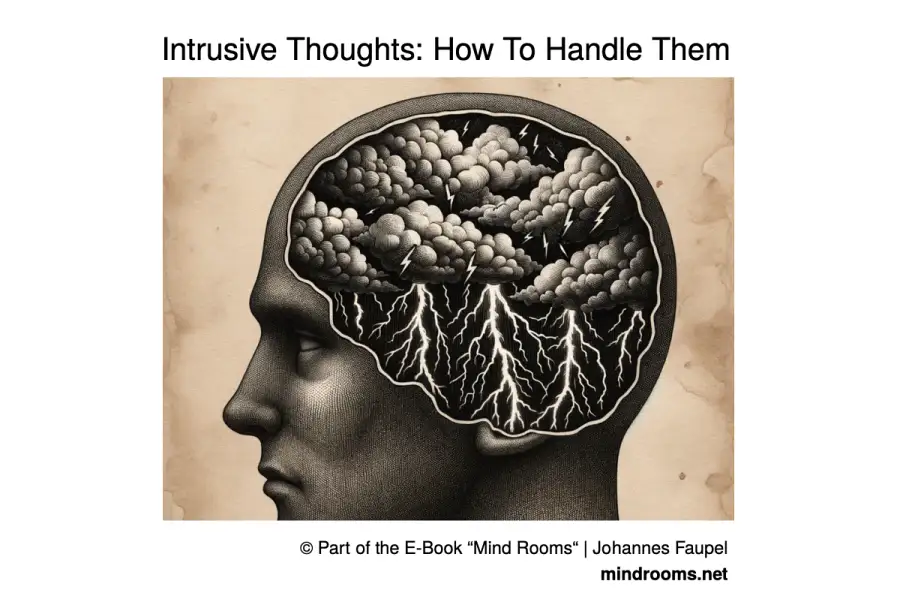
How to cope with intrusive thoughts
What are intrusive thoughts?
Intrusive thoughts are recurrent, “stubborn” thoughts nobody likes. They may be blaspheming, cruel, hurting and frighting. It seems that they want to harm us. As different they may be, they all have one in common: The more a person tries to fight against intrusive thoughts, the stronger they become.
- What are intrusive thoughts?
- Why become intrusive thoughts stronger while fighting against them?
- What do intrusive thoughts deal with?
- How do patients talk about when they describe intrusive thoughts?
- What are common solution attempts with intrusive thoughts?
- Why can therapeutic attempts of healing from thoughts often lead to the opposite?
- How can one help himself with intrusive thoughts?
- What other symptoms or diseases are associated to intrusive thoughts?
Why become intrusive thoughts stronger while fighting against them?
Fighting against a person or something like unwelcome thoughts need attention on the object that has to be beaten. So, if someone tries to “get rid of” thoughts by fighting against them, he strengthens the thoughts.
Note: The fact that attention leads to more size and importance of an object, is a natural phenomenon. So, there is nor disorder around when repetitive thoughts occur and “don’t want to leave”.
What do intrusive thoughts deal with?
Intrusive thoughts focus on inappropriate or troubling topics. They may address topics like death, violence, worries about inadequate behavior in certain situations. There is often the wish of controlling these thoughts. But, as mentioned, every attempt to control a thought will strengthen it.
How do patients talk about when they describe intrusive thoughts?
- “I am afraid to be infected by germs or contamination.”
- “All day long, I am trying to avoid making mistakes”
- “Hurting others, or causing disasters unintentionally, is my biggest fear.”
- “I do not want to cause embarrassment or shame by saying things that are inappropriate”
- “What if I will accidentally say something offensive out loud?”
What are common solution attempts with intrusive thoughts?
Common solution attempts with intrusive thoughts are “fighting against the thoughts”, “seeking therapeutic help against the thoughts”, “hoping for medicament to delete the thoughts.”
Why can therapeutic attempts of healing from thoughts often lead to the opposite?
By trying to fight the thoughts, they will become bigger and more “stable”. From the psychotherapeutic point of view, the patient is rigid and hardly to help. From a patient’s point of view, “I am unable to control these violent ideas. Because they come from my brain, I must be sick.” So, the wish to get rid of unwanted thoughts can lead to even more of them.
How can one help himself with intrusive thoughts?
The systemic Excentration Technique helped many people. It is a young technique, based on a principle as old as mankind. With excentration, we reframe and reinterpret the phenomena of “Intrusive thoughts.”
Here you find informations about the Excentration Technique, how it works and how you can help yourself.
What other symptoms or diseases are associated to intrusive thoughts?
If a person realizes, that the amount of intrusive thoughts increases, the person may be a bit more depressed. So, depressions are often associated with intrusive thoughts.
How are intrusive thoughts connected to depressions?
If a person suffers for a long time from bad thoughts, this might be frustrating and lead to a depressive mood.
Do you want to change a bit in your pattern and see what happens to your intrusive thoughts?
Explore this short-time therapy self-help concept, based on hundreds of systemic treatment and counseling sessions on OCD, anxiety and conflicts.
| More about this topic | Related topics |
|---|---|
| Excentration Technique Explained | Understanding Depression, Managing Anxiety, Overcoming OCD, |
Take five minutes and read the free reading sample of the e-book Mind Rooms – ready to download for you here.
